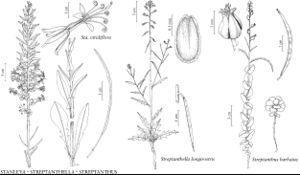Difference between revisions of "Stanleya viridiflora"
in J. Torrey and A. Gray, Fl. N. Amer. 1: 98. 1838.
FNA>Volume Importer |
imported>Volume Importer |
||
| (2 intermediate revisions by 2 users not shown) | |||
| Line 1: | Line 1: | ||
{{Treatment/ID | {{Treatment/ID | ||
|accepted_name=Stanleya viridiflora | |accepted_name=Stanleya viridiflora | ||
| − | |accepted_authority=Nuttall | + | |accepted_authority=Nuttall |
|publications={{Treatment/Publication | |publications={{Treatment/Publication | ||
|title=in J. Torrey and A. Gray, Fl. N. Amer. | |title=in J. Torrey and A. Gray, Fl. N. Amer. | ||
|place=1: 98. 1838 | |place=1: 98. 1838 | ||
|year=1838 | |year=1838 | ||
| + | }} | ||
| + | |special_status={{Treatment/ID/Special_status | ||
| + | |code=F | ||
| + | |label=Illustrated | ||
| + | }}{{Treatment/ID/Special_status | ||
| + | |code=E | ||
| + | |label=Endemic | ||
}} | }} | ||
|basionyms= | |basionyms= | ||
| Line 32: | Line 39: | ||
-->{{#Taxon: | -->{{#Taxon: | ||
name=Stanleya viridiflora | name=Stanleya viridiflora | ||
| − | |authority=Nuttall | + | |authority=Nuttall |
|rank=species | |rank=species | ||
|parent rank=genus | |parent rank=genus | ||
| Line 45: | Line 52: | ||
|publication title=in J. Torrey and A. Gray, Fl. N. Amer. | |publication title=in J. Torrey and A. Gray, Fl. N. Amer. | ||
|publication year=1838 | |publication year=1838 | ||
| − | |special status= | + | |special status=Illustrated;Endemic |
| − | |source xml=https:// | + | |source xml=https://bitbucket.org/aafc-mbb/fna-data-curation/src/2e0870ddd59836b60bcf96646a41e87ea5a5943a/coarse_grained_fna_xml/V7/V7_1207.xml |
|tribe=Brassicaceae tribe Thelypodieae | |tribe=Brassicaceae tribe Thelypodieae | ||
|genus=Stanleya | |genus=Stanleya | ||
Latest revision as of 22:30, 5 November 2020
Perennials; (caudex simple, covered with persistent petiolar remains); (glaucous), glabrous throughout. Stems erect, unbranched or branched distally, (2.5–)4–12(–14) dm. Basal leaves: petiole 2–10(–16) cm; blade lanceolate to oblanceolate or ovate, (2.2–)5–18(–22) cm × 10–40(–60) mm, margins often entire, sometimes dentate, rarely lyrate-pinnatifid. Cauline leaves sessile; blade lanceolate, (2–)3.5–8.5(–11) cm × (2–)5–19(–28) mm (smaller distally, base auriculate to sagittate), margins entire. Racemes loose. Fruiting pedicels horizontal to divaricate-ascending, 4–9(–12) mm. Flowers: sepals oblong-linear, 12–18 mm; petals whitish to lemon yellow, narrowly oblanceolate, 13–20 × 1–3 mm, claw 7–11 mm, (nearly linear-lanceolate), slightly wider at base, (margins usually erose, rarely subentire and crisped); filaments 11–20 mm; anthers 3.5–6 mm; gynophore (6–)11–22(–25) mm. Fruits divaricate or descending, curved inward, (torulose), subterete, 3–6(–7) cm × 1.2–2 mm; ovules 28–50 per ovary; style 0.04–0.3 mm. Seeds oblong, 2–3 × 1–1.2 mm. 2n = 28.
Phenology: Flowering May–Jul.
Habitat: Sagebrush and pinyon-juniper communities, limestone shale and rocks, red sandstone slopes, volcanic rocky slopes, clay knolls, steep bluffs
Elevation: 1300-2700 m
Distribution

Calif., Colo., Idaho, Mont., Nev., Oreg., Utah, Wyo.
Discussion
Stanleya collina M. E. Jones is an illegitimate name that pertains to S. viridiflora.
Selected References
None.
